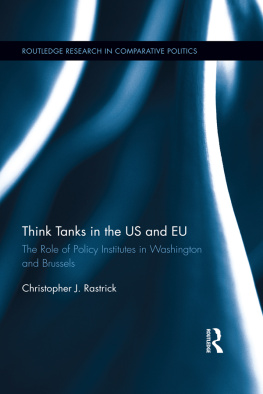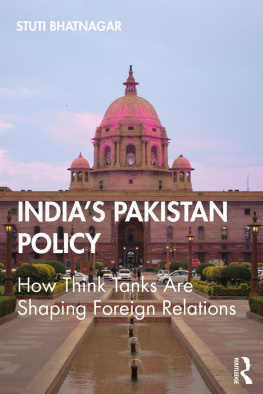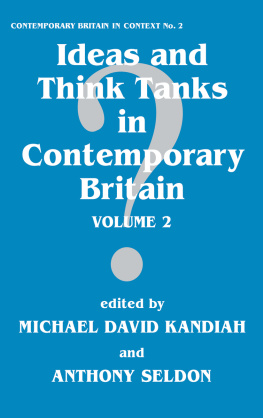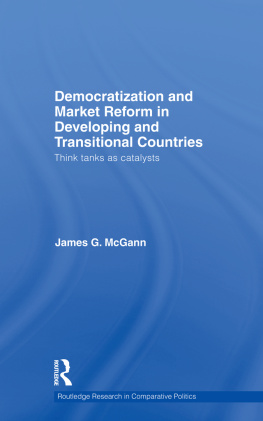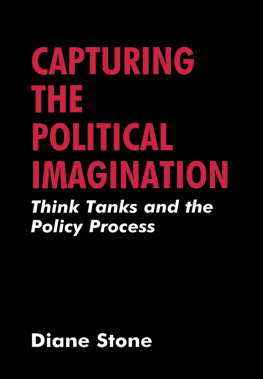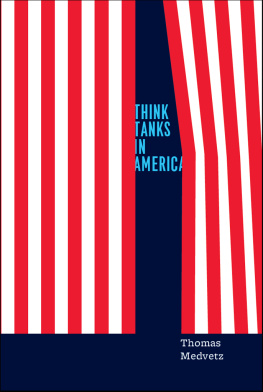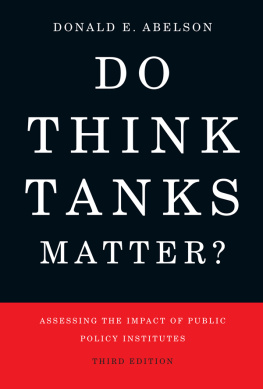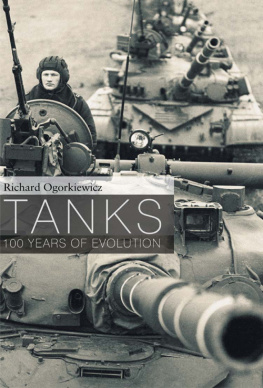A thoughtful, intelligent and meticulously-researched volume which offers a wealth of comparative insights on the role and reach of think tanks in the EU and the US. Rastricks study unearths new ground on how think tanks on both sides of the Atlantic generate and disseminate ideas to multiple stakeholders. Destined to enjoy a very long shelf life.
Donald E. Abelson, The University of Western Ontario
This book makes a welcome and important contribution to our understanding of the significant differences that exist between American think tanks and those EU-focussed think tanks based in Brussels. Rastricks analysis is clear, systematic and full of interesting insights into the cultural and structural causes that explain these differences. Anyone who wishes to understand how and why the think tank worlds of DC and Brussels differ needs to read to this book.
Stephen Brooks, University of Windsor (Canada) and University of Michigan (US)
Think Tanks in the US and EU
Why do US and EU think tanks diverge in their roles, priorities, and main constituencies? Providing the first substantive analytical comparison of think tanks in Washington and Brussels, this book explores the differences that exist and why they developed.
Two principal variables are identified institutional credibility and political culture as a measure of comparison between the two think tank models. Supranational think tanks have an inherent credibility with the institutions of the EU, which allows them to direct their resources and efforts to activities and outputs where they hold a comparative advantage. US think tanks lack such institutional recognition and so need to prove their credibility to their main constituencies. The result is that an adversarial and individualistic political culture has informed the norms and activities of Washington think tanks while the consensus-driven and collectivist political culture of Europe has influenced supranational think tanks. Think tanks are far from newcomers to the public policy scene, but our broader understanding of their role, structure and how they assess their own achievements is not yet fully developed.
By providing a framework within which to analyse this, this book will be of interest to academics, students and policy experts working within public policy, comparative politics and political science more generally.
Christopher J. Rastrick received his PhD in political science from the University of Western Ontario, in London, Canada. He regularly writes on public policy issues in Canada and beyond, appearing in the nations top newspapers and journals. His academic research interests include think tanks, CanadaEU relations, and regional integration initiatives.
Routledge Research in Comparative Politics
For a full list of titles, please visit: www.routledge.com/Routledge-Research-in-Comparative-Politics/book-series/CP
66 Generations, Political Participation and Social Change in Western Europe
Maria T. Grasso
67 The Politics of Think Tanks in Europe
Jesper Dahl Kelstrup
68 The Statecraft of Consensus Democracies in a Turbulent World
A Comparative Study of Austria, Belgium, Luxembourg, the Netherlands and Switzerland
Jos M. Magone
69 Policy Change under New Democratic Capitalism
Edited by Hideko Magara
70 Rampage Shootings and Gun Control
Politicization and Policy Change in Western Europe
Steffen Hurka
70 Growth, Crisis, Democracy
The Political Economy of Social Coalitions and Policy Regime Change
Edited by Hideko Magara and Bruno Amable
71 Think Tanks in the US and EU
The Role of Policy Institutes in Washington and Brussels
Christopher J. Rastrick
72 Institutions, Partisanship and Credibility in Global Financial Markets
Hye Jee Cho
73 Health and Political Engagement
Mikko Mattila, Lauri Rapeli, Hanna Wass and Peter Sderlund
First published 2018
by Routledge
2 Park Square, Milton Park, Abingdon, Oxon OX14 4RN
and by Routledge
711 Third Avenue, New York, NY 10017
Routledge is an imprint of the Taylor & Francis Group, an informa business
2018 Christopher J. Rastrick
The right of Christopher J. Rastrick to be identified as author of this work has been asserted by him in accordance with sections 77 and 78 of the Copyright, Designs and Patents Act 1988.
All rights reserved. No part of this book may be reprinted or reproduced or utilised in any form or by any electronic, mechanical, or other means, now known or hereafter invented, including photocopying and recording, or in any information storage or retrieval system, without permission in writing from the publishers.
Trademark notice: Product or corporate names may be trademarks or registered trademarks, and are used only for identification and explanation without intent to infringe.
British Library Cataloguing-in-Publication Data
A catalogue record for this book is available from the British Library
Library of Congress Cataloging-in-Publication Data
Names: Rastrick, Christopher J., author.
Title: Think tanks in the US and EU : the role of policy institutes in
Washington and Brussels / Christopher J. Rastrick.
Other titles: Think tanks in the United States and European Union
Description: Abingdon, Oxon ; New York, NY : Routledge, 2017. | Series:
Routledge research in comparative politics | Includes bibliographical
references and index.
Identifiers: LCCN 2017008023 | ISBN 9781138052178 (hardback) | ISBN
9781315167961 (e-book)
Subjects: LCSH: Policy sciencesResearchUnited States. | Policy
sciencesResearchEuropean Union countries. | Research institutes
United States. | Research institutesEuropean Union countries.
Classification: LCC H97 .R38 2017 | DDC 320.6072/04dc23
LC record available at https://lccn.loc.gov/2017008023
ISBN: 978-1-138-05217-8 (hbk)
ISBN: 978-1-315-16796-1 (ebk)
Typeset in Times New Roman
by Apex CoVantage, LLC
In many ways, the timing of this book could not be more fortuitous. In both Washington and Brussels the main epicenters of activity for American and supranational think tanks there are significant political changes taking place. In the US, the election of Donald Trump as president has undoubtedly left think tanks wondering where they fit in this new political landscape. After all, on the campaign trail then-candidate Trump vociferously rejected the old-guard establishment that has defined Washington political circles, with think tanks comprising a not-insignificant component. Yet, Trump is far from the first elected president to campaign with an outsider ethos and a promise to change the ostensibly staid Washington zeitgeist . For good reason, these outsider presidencies inevitably end up turning to think tanks as inspiration and sources of policy innovation. This has the ironic consequence of further entrenching the role of think tanks in the Beltway.
On the other side of the Atlantic Ocean, similarly powerful changes are afoot. On 23 June 2016, a narrow majority of British voters decided to support the withdrawal of the UK from the European Union. Much like the electoral victory of Donald Trump, the results of the Brexit vote were surprising, and generally mis-aligned with the predictions of scholars, pundits, and even public polling professionals. Think tanks in both the UK and Brussels were, generally speaking, similarly inclined to reject the populist appeal of the leave campaign as a veritable possibility. Since the referendum results, and despite continuing widespread shock and confusion, work is now under way to formally initiate the withdrawal process and chart a new relationship between the UK and EU (not to mention the UKs trade relations with the rest of the world). If there is a list of organizations and industries that stand to benefit from this, we can count supranational think tanks among the most eligible. They are perfectly positioned to facilitate the difficult discussions that need to take place as industry, policymakers, EU and international governments, and the broader public attempt to make sense of how the EU moves forward despite this very public and very humbling vote of nonconfidence. If they heed this opportunity, Brussels and the rest of the world might very well owe a debt of gratitude to these organizations.

